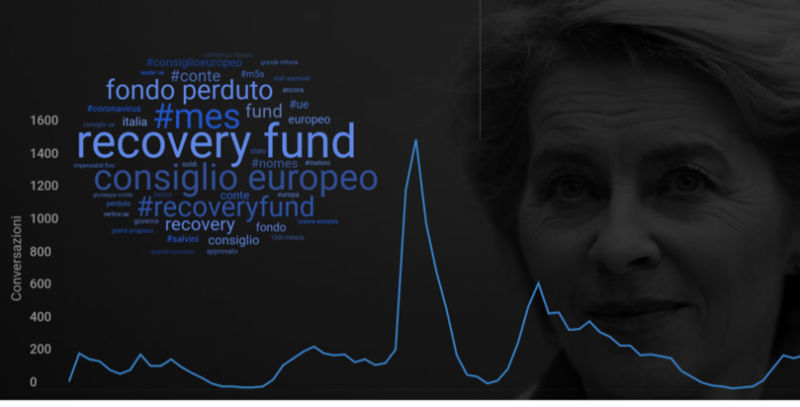DESPITE VISCO, ALL THE REASONS WHY THE HEALTHCARE MONTH IS BAD (by Giuseppe Liturri)

There are events that manage to concentrate much of the bad knowledge in Italy. When a para-cultural event comes to be paid for by contributions from public bodies you can be sure that what will result from it will not be the result of a scientific discussion, but the wishes of the payers.
So it is for the "Festival of the economy of Trento", yet another show of destructive will of our country. The choir of pro MES voices was joined by that of Vincenzo Visco, governor of the Bank of Italy, who gets into a straight leg on this burning issue, with political considerations that go far beyond his task.
For this we propose a summary of all the reasons for the NO to the Mes, excellently summarized by Giuseppe Liturri on Startmag . We couldn't do better. Enjoy the reading.
- The ESM ONLY finances healthcare costs directly and indirectly connected to Covid. So there is no room for those who delude themselves to finance us any other chapter, however preponderant, of healthcare spending in Italy . In detail: the annual endowment of the National Health Fund (FSN) is approximately 120 billion. It is enough to have a minimum sense of proportions between all the other pathologies unfortunately existing and Covid, to realize that we could never justify expenses for 36 billion connected to Covid. Not surprisingly, the government has included only 1.7 billion in higher health costs in one of the spring decrees. Only those we could possibly report to the Mes, if we access the financing. It will also be possible to report a share of the costs of the health system that has been hijacked in support of Covid, for example the wards of other diseases converted for a few weeks into Covid wards; but we always talk about modest sums.
Those who invoke the Mes, suddenly taken by love for our health care, must have the intellectual honesty to admit that a new spending law is needed, as there is very little current legislation in order to successfully access the loan of the Mes. Unfortunately, these are almost always the same political subjects who, starting from 2011, have prevented, through cuts, a physiological growth of the FSN, allowing it to barely keep pace with inflation, when following the progress of research and technology would have required double-digit growth rates. They are the champions of the recovery plans that have done so much harm to our health care. The fact that the Sure loan has been in great demand is a confirmation of the toxicity of the ESM: how come 17 countries have come (Italy should receive 27 billion) and no one has asked for the ESM? It should be noted that the Sure finances expenses already foreseen in current legislation (layoffs, indemnity 600 euros, etc …) and therefore does not increase the deficit / GDP already authorized. The ESM, as explained, involves a prior spending decision and therefore an increase in the deficit.
- The ESM loan would not arrive immediately . In fact, it is known from the official documents that it will be paid in monthly installments not exceeding 15% of the total so, at best, it will take at least 7 months to receive the entire sum. Does anyone in this country seriously believe that we have to wait for the money with the dropper to start a robust program to strengthen the health system, which is also necessary regardless of Covid-19?
- The theme of economic convenience given by the presumed difference between the 10-year BTP rate and the probable interest rate of the Mes around 0 / 0.10% is the result of a meaningless subtraction , from rejection of any basic finance course where they teach to compare the rates of financial instruments that are homogeneous in terms of terms, duration and guarantees.
- There is no homogeneity of conditions . The debt with public securities does not provide for any. The ESM, on the other hand, provides for a specific restriction on the destination of expenses related to Covid-19. It also provides, what is even more serious, the mandatory (while in other cases it remains a faculty) subjecting to enhanced surveillance measures (from the moment of the request to full disbursement) and post-program surveillance (until the repayment of at least 75% of the loan), as explained in detail in point 4.
- There is no homogeneity of guarantees . According to the founding Treaty, the Mes is a privileged creditor, while all the other creditors of the State are “pari passu”. All (Gualtieri in the lead) slip away from the question aimed at knowing the hypothetical rate of a syndicated loan (ie underwritten by a few large institutional investors) requested on the market by the Italian State, offering creditors the status of privileged creditor. On the 10-year maturity, some market participants believe that a rate of around 0.10% can be achieved. At this point the difference with the ESM rate would become non-existent and the presumed billions of savings would evaporate. Alternatively, if the privilege were not a problem, would Gualtieri have the courage to ask the MES for the loan, specifying that the privileged creditor status does not apply? Very unlikely that Director Regling would still charge a rate around zero. Let us overlook the probable worsening of the yield on the mass of public securities as a result of the entry of a privileged creditor in the repayment. There are conflicting theses in this regard. However, it should be noted that, on a mass of debt of 2,500 billion, a few basis points for an increase in rates are enough to nullify any benefit received from the ESM loan.
- There is no homogeneity of duration . The rate of the Mes is variable and depends on their cost of funding when they are financed by issuing bonds, therefore it is not comparable with the rate of the BTP 10A. Making free collection choices by duration and currency which obviously have a risk, the ESM has clearly stated that it automatically passes on the related cost to the debtor countries, as has already happened with Spain, Greece, Ireland, Portugal and Cyprus. In the case of the Pandemic Crisis Support line, fortunately, the average cost (plus commissions) of these issues, to be passed on to the debtor, will come from a separate and dedicated “warehouse”. So why be mediated by the choices of the Mes, when we have the possibility to go independently on the markets? What if the Italian Treasury deems it more appropriate to finance itself with a 12-month Bot (today at -0.22%), running the relative interest rate and liquidity risk (which is currently quite negligible) compared to a 10-year BTP? Or to issue US dollar bonds on other maturities (although more expensive today)? Making a difference today between the BTP rate and the Mes rate and projecting it for 10 years to calculate the interest savings, is an exercise that returns a different result every day. And this is enough to declare its inconsistency. And if the 10A BTP rate, as probable given the large purchases by the ECB, drops to around 0%, where would the billions of interest savings go?
- The ECB purchases in progress and planned until mid-2021 with the PEPP program (with reinvestments of the securities maturing at least until the end of 2022), and until the moment in which rates are raised with the APP program (with reinvestments for a sufficiently long period after the rate hike) are substantial. In the period March / July, the net issues of the Mef amounted to 108 billion, while the net purchases of the ECB amounted to 109 billion (36 Pspp and 73 Pepp). This means that all the greater needs of the Treasury have been absorbed by the ECB which will continue to do so at the rate of 25 billion a month . In practice, on the market, other operators (especially banks) already know that it will be enough to buy BTPs at auction and then sell them to the ECB and, if they wanted to increase their stocks, they would find themselves faced with an insufficient supply, with consequent rise in prices and a fall. of rates. Which has been happening regularly since May. Furthermore, the cost of those 109 billion (for a total of approximately 500 billion held as at 31/7) of Italian government bonds purchased by the ECB / Bank of Italy is essentially zero. In fact, those interests will return from the Bank of Italy to the Treasury in the form of dividends from the 2020 budget. Ultimately, the marginal cost of the Italian debt purchased by the ECB is zero and will remain so for a long time, as long as the renewals continue. And they will continue, otherwise the eurozone will dissolve .
- The ESM is the antechamber of the Troika and corrective macroeconomic measures . In fact, the letter from Gentiloni and Dombrovkis dated May 7th has the nature of a mere political commitment and has no legal value . Given that nothing changes in the ESM Treaty (in which articles 13 and 14 trace the path that leads to a macroeconomic adjustment program), it promises to disapply article 3 (paragraphs 3, 4 and 7), Article 7 and 14 of Regulation 472/2013 governing enhanced and post-program surveillance. This letter, not surprisingly, only gave rise to the modification of a delegated regulation (877/2013) which provides for the reporting for the Member State subject to monitoring (pursuant to Article 10 of Regulation 473/2013). No changes were made to Regulation 472/2013. Why did they decide to change an aspect that is, after all, residual, such as a table for the report of expenses, with a legislative act, and have they left 472/2013 unchanged? Was it perhaps because the Commission intended to leave it exactly as it is? With the threat of corrective measures prominently in Article 14 (4)?
The Troika exists, exists, and could soon be among us, dear Governor of the Bank of Italy.

Thanks to our Telegram channel you can stay updated on the publication of new articles of Economic Scenarios.
The article DESPITE VISCO, ALL THE REASONS WHY THE HEALTH MONTH IS BAD (by Giuseppe Liturri) comes from ScenariEconomici.it .
This is a machine translation of a post published on Scenari Economici at the URL https://scenarieconomici.it/nonostante-visco-tutti-i-motivi-per-cui-il-mes-sanitario-e-male-da-giuseppe-liturri/ on Mon, 28 Sep 2020 08:50:02 +0000.

